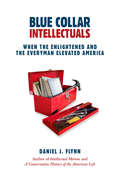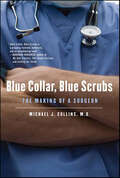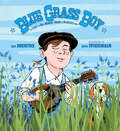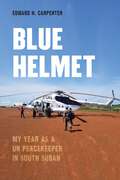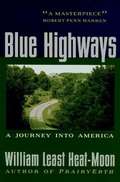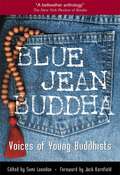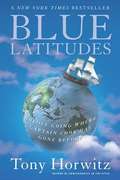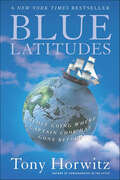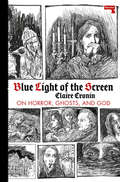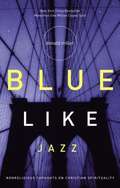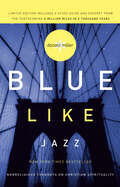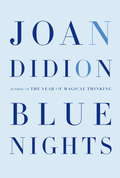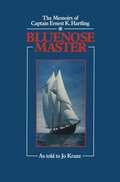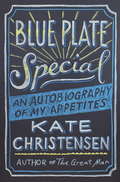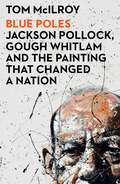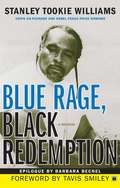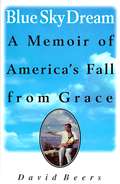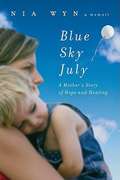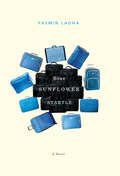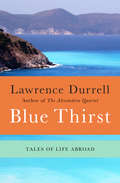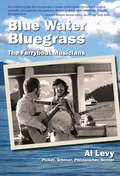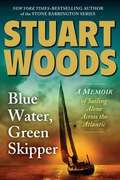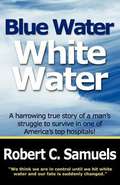- Table View
- List View
Blue Collar Intellectuals
by Daniel FlynnStupid is the new smart--but it wasn't always soPopular culture has divorced itself from the life of the mind. Who has time for great books or deep thought when there is Jersey Shore to watch, a txt 2 respond 2, and World of Warcraft to play?At the same time, those who pursue the life of the mind have insulated themselves from popular culture. Speaking in insider jargon and writing unread books, intellectuals have locked themselves away in a ghetto of their own creation.It wasn't always so.Blue Collar Intellectuals vividly captures a time in the twentieth century when the everyman aspired to high culture and when intellectuals descended from the ivory tower to speak to the everyman. Author Daniel J. Flynn profiles thinkers from working-class backgrounds who played a prominent role in American life by addressing their intellectual work to a mass audience. Blue Collar Intellectuals shows us how much everyone--intellectual and everyman alike--has suffered from mass culture's crowding out of higher things and the elite's failure to engage the masses.
Blue Collar Intellectuals: When the Enlightened and the Everyman Elevated America
by Daniel J. FlynnStupid is the new smart—but it wasn&’t always so Popular culture has divorced itself from the life of the mind. Who has time for great books or deep thought when there is Jersey Shore to watch, a txt 2 respond 2, and World of Warcraft to play? At the same time, those who pursue the life of the mind have insulated themselves from popular culture. Speaking in insider jargon and writing unread books, intellectuals have locked themselves away in a ghetto of their own creation. It wasn&’t always so. Blue Collar Intellectuals vividly captures a time in the twentieth century when the everyman aspired to high culture and when intellectuals descended from the ivory tower to speak to the everyman. Author Daniel J. Flynn profiles thinkers from working-class backgrounds who played a prominent role in American life by addressing their intellectual work to a mass audience. Blue Collar Intellectuals tells the fascinating story of the unschooled hobo who migrated from skid row anonymity to White House chats with the president and prime-time TV specials. Blue Collar Intellectuals tells the fascinating story of: •The scandalous teacher-student romance that spawned a half-century labor of love in writing the history of the world. •The Ivy League Ph.D. who held neither a high school nor college degree, and fittingly launched a renaissance in reading the great books outside of formal schools. •The scholarship student who experienced the free market firsthand waiting tables and peddling socks, and who became one of capitalism&’s most influential exponents. •The impoverished outcast who became the poet of the pulps, elevating millions of readers along with heretofore marginal genres. Guiding us through a world now vanished, Flynn causes us to look anew at our own digital age and its nostrums: Video gaming is just a new form of literacy, Reality shows . . . Challenge our emotional intelligence, and Who cares if Johnny can&’t read? The value of books is overstated. Blue Collar Intellectuals shows us how much everyone intellectual and everyman alike has suffered from mass culture&’s crowding out of higher things and the elite&’s failure to engage the masses.
Blue Collar, Blue Scrubs: The Making of a Surgeon
by Michael J. CollinsIt looked for a while like Michael Collins would spend his life breaking concrete and throwing rocks for the Vittorio Scalese Construction Company. He liked the work and he liked the pay. But a chance remark by one of his coworkers made him realize that he wanted to involve himself in something bigger, something more meaningful than crushing rocks and drinking beer. In his acclaimed first memoir, Hot Lights, Cold Steel, Collins wrote passionately about his four-year surgical residency at the prestigious Mayo Clinic. Blue Collar, Blue Scrubs turns back the clock, taking readers from his days as a construction worker to his entry into medical school, expertly infusing his journey to become a doctor with humanity, compassion and humor. From the first time he delivers a baby to being surrounded by death and pain on a daily basis, Collins compellingly writes about how medicine makes him confront, in a very deep and personal way, the nature of God and suffering—and how delicate life can be.
Blue Grass Boy: The Story of Bill Monroe, Father of Bluegrass Music
by Barb RosenstockLearn about the creation of the unique American music called bluegrass through the story of Bill Monroe.Bill Monroe loved many things: playing music, his big family, and his home in the bluegrass state of Kentucky. Even though his eyes were crossed and didn't work right, Bill's ears worked hard, picking out all sorts of sounds around his treasured home: rushing streams, wailing winds, and sundown jamborees with his family. Through heartache and hard times, Bill held on to these sounds that reminded him of home. Award-winning author Barb Rosenstock and illustrator Edwin Fotheringham beautifully capture the ups and downs of Bill Monroe's musical journey, and how his deep Kentucky roots helped him create a unique form of American music--bluegrass. Chuck Berry, Buddy Holly, Johnny Cash and Jerry Garcia all credit Bill Monroe with influencing their music.
Blue Helmet: My Year as a UN Peacekeeper in South Sudan
by Edward H. CarpenterBlue Helmet: My Year as a UN Peacekeeper in South Sudan tells the story of a country, a conflict, and the institution of peacekeeping through the eyes of a senior American military officer working on the ground in one of the most dangerous countries on the planet. South Sudan is rich in natural resources, and its fertile soil could make it the breadbasket of East Africa. Yet it remains the poorest and most corrupt country in the region, plagued by disease, famine, and ethnic strife. Abductions, sexual violence, death, and displacement affect tens of thousands of people each year. Edward H. Carpenter pulls readers into his world, allowing them to experience the powerful, poignant realities of being a peacekeeper in South Sudan. In the process, the author reveals how the United Nations really conducts its missions: what it tolerates and how it often falls short of achieving the aims of its charter—equal rights, justice, and economic advancement for all people—with the use of armed forces limited to serving those common interests by keeping the peace and preventing the scourge of war. It is a story that is eye-opening, unsettling, and always compelling. Global leaders may fairly claim that they have done everything they can to help South Sudan help itself: they&’ve dispatched thousands of peacekeepers and provided billions of dollars in aid. So why is the UN still struggling to fulfill its mandate to protect civilians and safeguard the delivery of humanitarian assistance? What could be done better? Bringing the reader to the forefront of action, Blue Helmet answers these questions and raises others about how modern peacekeeping missions are organized and overseen, shedding light on some of the contradictions at the heart of peacekeeping.
Blue Highways: A Journey Into America
by William Least Heat-MoonWilliam Least Heat-Moon's journey into America began with little more than the need to put home behind him. At a turning point in his life, he packed up a van he called Ghost Dancing and escaped out of himself and into the country. The people and the places he discovered on his roundabout 13,000-mile trip down the back roads ("blue highways") and through small, forgotten towns are unexpected, sometimes mysterious, and full of the spark and wonder of ordinary life. Robert Penn Warren said, "He has a genius for finding people who have not even found themselves. " The power of Heat-Moon's writing and his delight in the overlooked and the unexamined capture a sense of our national destiny, the true American experience.
Blue Jean Buddha
by Jack Kornfield Sumi LoundonIn an age when the Dalai Lama's image has been used to sell computers, rock stars have used tantra to enhance their image, and for many, Nirvana calls to mind a a favorite band, what does Buddhism mean to twenty-somethings? Blue Jean Buddha offers real stories about young Buddhists in their own words that affirm and inform the young adult Buddhist experience. This one-of-a-kind book is about the experiences of young people in America-from their late teens to early thirties-who have embraced Buddhism. Thirty-three first-person narratives reflect on a broad range of life-stories, lessons, and livelihood issues, such as growing up in a Zen center, struggling with relationships, caring for the dying, and using marathon running as meditation. Throughout, up-and-coming author Sumi Loundon provides an illuminating context for the tremendous variety of experiences shared in the book. Blue Jean Buddha was named a finalist in the 2002 Independent Publisher Book Awards (Multicultural Non-Fiction - Young Adult) as well in NAPRA's Nautilus Awards, in the Personal Journey/Memoir/Biography category.
Blue Latitudes: Boldly Going Where Captain Cook Has Gone Before
by Tony HorwitzTwo centuries after James Cook's epic voyages of discovery, Tony Horwitz takes readers on a wild ride across hemispheres and centuries to recapture the Captain's adventures and explore his embattled legacy in today's Pacific. Horwitz, a Pulitzer Prize-winner and author of Confederates in the Attic, works as a sailor aboard a replica of Cook's ship, meets island kings and beauty queens, and carouses the South Seas with a hilarious and disgraceful travel companion, an Aussie named Roger. He also creates a brilliant portrait of Cook: an impoverished farmboy who became the greatest navigator in British history and forever changed the lands he touched. Poignant, probing, antic, and exhilarating, Blue Latitudes brings to life a man who helped create the global village we inhabit today.
Blue Latitudes: Boldly Going Where Captain Cook Has Gone Before
by Tony HorwitzNew York Times Bestseller: A Pulitzer Prize–winning author retraces the voyages of Captain James Cook: “Alternately hilarious, poignant, and insightful.” —Seattle TimesCaptain James Cook’s three epic journeys in the eighteenth century were the last great voyages of discovery. His ships sailed 150,000 miles, from the Arctic to the Antarctic, from Tasmania to Oregon, from Easter Island to Siberia. When Cook set off for the Pacific in 1768, a third of the globe remained blank. By the time he died in Hawaii in 1779, the map of the world was substantially complete.Tony Horwitz, author of Confederates in the Attic, vividly recounts Cook’s voyages and the exotic scenes the captain encountered: tropical orgies, taboo rituals, cannibal feasts, human sacrifice. He also relives Cook’s adventures by following in his wake to places such as Tahiti, Savage Island, and the Great Barrier Reef to discover Cook’s embattled legacy in the present day. Signing on as a working crewman aboard a replica of Cook’s vessel, Horwitz experiences the thrill and terror of sailing a tall ship. He also explores Cook the man: an impoverished farm boy who broke through the barriers of his class and time to become the greatest navigator in British history, whose voyages helped create the “global village” we know today.“With healthy doses of both humor and provocative information, the book will please fans of history, exploration, travelogues and, of course, top-notch storytelling.” —Publishers Weekly“Horwitz retells the sailor’s story and tries to re-create first contact from the point of view of the locals—Tahitians, Maoris, Aleuts, Hawaiians, and others—and judge the legacy of his landing . . . thought-provoking . . . brims with insight.” —Booklist“A rollicking read that is also a sneaky work of scholarship . . . new and unexpected insights into the man who out-discovered Columbus. A terrific book.” —Nathaniel Philbrick, National Book Award winner and New York Times–bestselling author of In the Heart of the Sea“Well-researched, gripping, and peppered with humorous passages.” —St. Louis Post-Dispatch“Part Cook biography, part travelogue, and very much a stroke of genius.” —Philadelphia Inquirer
Blue Light of the Screen: On Horror, Ghosts, and God
by Claire CroninBlue Light of the Screen is a memoir about the author's obsession with horror and the supernatural.Blue Light of the Screen is about what it means to be afraid -- about immersion, superstition, delusion, and the things that keep us up at night. A creative-critical memoir of the author's obsession with the horror genre, Blue Light of the Screen embeds its criticism of horror within a larger personal story of growing up in a devoutly Catholic family, overcoming suicidal depression, uncovering intergenerational trauma, and encountering real and imagined ghosts.As Cronin writes, she positions herself as a protagonist who is haunted by what she watches and reads, like an antiquarian in an M.R. James ghost story whose sense of reality unravels through her study of arcane texts and cursed archives. In this way, Blue Light of the Screen tells the story of the author's conversion from skepticism to faith in the supernatural.Part memoir, part ghost story, and part critical theory, Blue Light of the Screen is not just a book about horror, but a work of horror itself.
Blue Like Jazz: Nonreligious Thoughts on Christian Spirituality
by Donald MillerDonald Miller would like to introduce you to "Christian spirituality." If you're a Christian, he wants you to consider a less dogmatic and stodgy way. And if you're a nonbeliever, he would like to introduce you to Jesus through Christian spirituality. But first he must introduce himself. He just wants you to know that he likes you, and if you were to meet, he would listen to your story. He even thanks you for listening to his story right there at the end of the book. Jesus is of course the same way. He likes you, wants to listen to your story, and wants you to hear his.
Blue Like Jazz: Nonreligious Thoughts on Christian Spirituality
by Donald Miller"I never liked jazz music because jazz music doesn't resolve. I used to not like God because God didn't resolve. But that was before any of this happened." ?Donald Miller In Donald Miller's early years, he was vaguely familiar with a distant God. But when he came to know Jesus Christ, he pursued the Christian life with great zeal. Within a few years he had a successful ministry that ultimately left him feeling empty, burned out, and, once again, far away from God. In this intimate, soul-searching account, Miller describes his remarkable journey back to a culturally relevant, infinitely loving God. For anyone wondering if the Christian faith is still relevant in a postmodern culture. For anyone thirsting for a genuine encounter with a God who is real. For anyone yearning for a renewed sense of passion iná life. Blue Like Jazz is a fresh and original perspective on life, love, and redemption.
Blue Nights (Playaway Adult Nonfiction Ser.)
by Joan DidionFrom one of our most powerful writers, a work of stunning frankness about losing a daughter. Richly textured with bits of her own childhood and married life with her husband, John Gregory Dunne, and daughter, Quintana Roo, this new book by Joan Didion examines her thoughts, fears, and doubts regarding having children, illness, and growing old. Blue Nights opens on July 26, 2010, as Didion thinks back to Quintana's wedding in New York seven years before. Today would be her wedding anniversary. This fact triggers vivid snapshots of Quintana's childhood--in Malibu, in Brentwood, at school in Holmby Hills. Reflecting on her daughter but also on her role as a parent, Didion asks the candid questions any parent might about how she feels she failed either because cues were not taken or perhaps displaced. "How could I have missed what was clearly there to be seen?" Finally, perhaps we all remain unknown to each other. Seamlessly woven in are incidents Didion sees as underscoring her own age, something she finds hard to acknowledge, much less accept. Blue Nights--the long, light evening hours that signal the summer solstice, "the opposite of the dying of the brightness, but also its warning"--like The Year of Magical Thinking before it, is an iconic book of incisive and electric honesty, haunting and profoundly moving.From the Hardcover edition.
Blue Nose Master: The Memoirs of Captain Ernest K. Hartling
by Ernest K. Hartling Jo KranzCaptain Ernest Hartling, born in Spanish Ship Bay, Nova Scotia, in 1906, takes us on a voyage through a life crammed with adventure, colour, and excitement.
Blue Plate Special
by Kate ChristensenFrom acclaimed novelist Kate Christensen, Blue Plate Special is a mouthwatering literary memoir about an unusual upbringing and the long, winding path to happiness."To taste fully is to live fully." For Kate Christensen, food and eating have always been powerful connectors to self and world--"a subterranean conduit to sensuality, memory, desire." Her appetites run deep; in her own words, she spent much of her life as "a hungry, lonely, wild animal looking for happiness and stability." Now, having found them at last, in this passionate feast of a memoir she reflects upon her journey of innocence lost and wisdom gained, mistakes made and lessons learned, and hearts broken and mended. In the tradition of M. F. K. Fisher, Laurie Colwin, and Ruth Reichl, Blue Plate Special is a narrative in which food--eating it, cooking it, reflecting on it--becomes the vehicle for unpacking a life. Christensen explores her history of hunger--not just for food but for love and confidence and a sense of belonging--with a profound honesty, starting with her unorthodox childhood in 1960s Berkeley as the daughter of a mercurial legal activist who ruled the house with his fists. After a whirlwind adolescent awakening, Christensen strikes out to chart her own destiny within the literary world and the world of men, both equally alluring and dangerous. Food of all kinds, from Ho Hos to haute cuisine, remains an evocative constant throughout, not just as sustenance but as a realm of experience unto itself, always reflective of what is going on in her life. She unearths memories--sometimes joyful, sometimes painful--of the love between mother and daughter, sister and sister, and husband and wife, and of the times when the bonds of love were broken. Food sustains her as she endures the pain of these ruptures and fuels her determination not to settle for anything less than the love and contentment for which she's always yearned. The physical and emotional sensuality that defines Christensen's fiction resonates throughout the pages of Blue Plate Special. A vibrant celebration of life in all its truth and complexity, this book is about embracing the world through the transformative power of food: it's about listening to your appetites, about having faith, and about learning what is worth holding on to and what is not.
Blue Poles: Jackson Pollock, Gough Whitlam and the Painting That Changed a Nation
by Tom McIlroyThe captivating story behind the iconic Blue Poles - the painter, the process, the patronage, the politics and the national scandal.In 1973, Blue Poles, the iconic painting by America's great abstract expressionist Jackson Pollock, was acquired by the Australian government for A$1.4 million. This record-setting price for an artwork sparked a media sensation and controversy both in Australia and the United States.Blue Poles: Jackson Pollock, Gough Whitlam and the painting that changed a nation details how Jackson Pollock rose to fame, the negotiations that led to the artwork's move to the National Gallery of Australia, and the many successes and turbulent turns in between.This story covers Pollock's entrée into an art circle which included renowned patron Peggy Guggenheim, as well as his relationship with artist Lee Krasner, and the larger-than-life accounts that surrounded his artistic practice - including questions around the creation of Blue Poles.It was Gough Whitlam's commitment to the arts and cultural capital that would see the painting move to another continent, where the media feasted on stories of its cost and brows were raised over its merit. The value of Blue Poles to the Australian art and museum landscape was yet to be foreseen. Journalist Tom McIlroy tells a compelling account of one of Australia's most prized paintings, which stirred up many storms from the time of its creation to its placement in the NGA.
Blue Rage, Black Redemption
by Tavis Smiley Stanley Tookie Williams Barbara BecnelA gripping tale of personal revolution by a man who went from Crips co-founder to Nobel Peace Prize nominee, author, and antigang activist When his L.A. neighborhood was threatened by gangbangers, Stanley Tookie Williams and a friend formed the Crips, but what began as protection became worse than the original gangs. From deadly street fights with their rivals to drive-by shootings and stealing cars, the Crips' influence -- and Tookie's reputation -- began to spread across L.A. Soon he was regularly under police surveillance, and, as a result, was arrested often, though always released because the charges did not stick. But in 1981, Tookie was convicted of murdering four people and was sent to death row at San Quentin in Marin County, California. Tookie maintained his innocence and began to work in earnest to prevent others from following his path. Whether he was creating nationwide peace protocols, discouraging adolescents from joining gangs, or writing books, Tookie worked tirelessly for the rest of his life to end gang violence. Even after his death, his legacy continues, supported by such individuals as Archbishop Desmond Tutu, Snoop Dogg, Jesse Jackson, and many more. This posthumous edition of Blue Rage, Black Redemption features a foreword by Tavis Smiley and an epilogue by Barbara Becnel, which details not only the influence of Tookie's activism but also her eyewitness account of his December 2005 execution, and the inquest that followed. By turns frightening and enlightening, Blue Rage, Black Redemption is a testament to the strength of the human spirit and an invaluable lesson in how rage can be turned into redemption.
Blue Skies, No Fences
by Lynne CheneyIn Blue Skies, No Fences: A Memoir of Childhood and Family, Lynne Cheney re-creates the years after World War II in a small town on the high plains of the West. Portraying an era that started with the Ink Spots on the Zenith Radio in her family's living room and ended with Elvis on the jukebox at the local canteen, she tells of coming of age in a time when the country seemed in control of its destiny and individual Americans in charge of theirs. She describes Casper, Wyoming, where she met a young man named Dick Cheney, and remembers her hometown as a place where the future seemed as bright as the blue sky and life's possibilities as boundless as the prairie. It was also a place where a pioneer heritage prevailed, and Cheney traces the paths of forebears who journeyed westward, strengthened against adversity by a bedrock belief that they would find a better life. An uplifting exploration of a special time and place in American history, Blue Skies, No Fences is also a heartfelt tribute to those optimistic souls who, in Lynne Cheney's words, "pinned their hopes on America and kept heading west."
Blue Sky Dream
by David BeersBeer’s “important. . . fascinating” book(Los Angeles Times) shows how suburban California came to epitomize the american Dream-until its affluent complacency was shattered by downsizing, anxiety, and distrust.
Blue Sky July
by Nia Wyn"My heart has reshaped a thousand broken pieces, and for every moment I still want to heal him there are a thousand when I know he's perfect, exactly as he is"This book will challenge your heart and change your views. Set between the summers of 1998 and 2005 in Cardiff, Blue Sky July is the true story of Nia, whose son Joe suffers a devastating brain injury. Through her intimate day-by-day musings, the book explores the impact of the tragedy on Nia's home life, love life, friendships and connection to the world, as the most extraordinary relationship unfolds between herself and Joe. Lyrical, inspiring and utterly compelling, Nia Wyn's powerful yet acutely sensitive account of her experiences will make an indelible impression on all who read it. A testament to the power of a mother's unconditional love for her son, Blue Sky July is a book that deserves to be read by everyone.
Blue Sunflower Startle
by Yasmin LadhaIn the early 1960s, a young girl and her brother move to their grandparents’ flourmill in Dodoma in newly-independent Tanzania. Her grandfather bellows his love for East Africa, where he and other Indian merchants have thrived. But the ground is shifting. President Nyerere is calling for the widespread nationalization of property. The hum of the mill has quieted. The young girl prays at the jamatkhana and spends evenings at the cinema watching cowboy films—grief and grievances, if only momentarily, disappear. Years later, the girl and her family immigrate to Calgary, Alberta and she begins a love affair with the prairies. Wary that her grandfather’s passion for his country consumed him, she is unwilling to settle for geographical monogamy. She travels to Chonju, South Korea to work as a language teacher, and Delhi, India for trysts with her Kashmiri lover. Frequently, she is startled by the appearance of things that remind her of the prairies, but show up in other countries. She aches for a home that beckons her return: the Canadian West, the hero that pulls a U-turn for its beloved. Yasmin Ladha offers readers an exquisite exploration of the ways in which one can love a country. Written in unusual, intoxicating, and poetic prose, Blue Sunflower Startle is a modern day Romance for frequent travellers and nomadic spirits.
Blue Thirst: Tales of Life Abroad
by Lawrence DurrellA pair of lectures from one of the twentieth century&’s most mesmerizing speakersLawrence Durrell was in his early twenties when, tired of the stiffness of London life, he took his family to live in Corfu. Interwar Greece, whose hard beds and mosquito swarms Durrell documented so tenderly in Prospero&’s Cell, was no more. In the first of this pair of lectures, given during a 1970s visit to California, Durrell recalls those days, talking of family, poetry, and the joy of the islands as no other writer can. When war came to the Mediterranean, Durrell was swept into diplomatic service, an adventure he recounts in his second lecture. Though a diplomat of the modern world, he served under men whose experience stretched back to the days before the telephone, when solutions for crises had to be devised by the ambassador, and not phoned in from London. These two lectures on long-vanished worlds are an elegant demonstration of the evocative power of Durrell&’s unmatched storytelling.
Blue Water Bluegrass: The Ferryboat Muscians
by Al LevyThis is a story of a magical time and place that was very real. Magic is the power to transform. See for yourself how a couple of young men transformed an ordinary ferry ride into Ferryboat Music. Their music touched and changed the lives of thousands who saw them every weekend on the sparkling waters of Puget Sound. This is a story of transforming fear into love, mundane into miraculous, and isolation into connection. Feel the heart and the humor in every story in these pages.
Blue Water, Green Skipper: A Memoir of Sailing Alone Across the Atlantic
by Stuart Woods Stephen CollinsStuart Woods had never owned more than a dinghy before setting out on one of the world's most demanding sea voyages, navigating single-handedly across the Atlantic. How, at the age of thirty-seven, did this self-proclaimed novice go from small ponds to the big sea?<P> Now with a new afterword that looks back at how one transatlantic race changed his life, Woods takes readers on a spectacular journey not just of traveling across the world, but of being tried in fire, learning by accepting challenges, appreciating the beauty of the open water, and living to tell about it.
Blue Water, White Water
by Robert C. SamuelsWithout self-pity, former New York City newspaperman and prize-winning magazine editor, Robert C. Samuels tells his own harrowing story of medical survival. He's filled it with tears, humor, love and triumph. "Audacious, brilliantly written, Blue Water, White Water, is a rare, first-person look at a world that is often closed to the average person. It is well worth your time," raves an early critic. "A riveting, vivid story!" Jan Dye Gussow, author of Growing Older: A Chronicle of Death, Life, and Vegetables. "Producers will pounce. This book IS a movie!" Carolyn Fox, Entertainment News Calendar. "Should be required reading for all medical and nursing students! A must read!" Nursing Professor Barbara Riso, R.N. "Wow! Written with an amazing ability to portray a true, horrific story that keeps readers glued to the page and laughing at the same time," Peggy Whalen, R.N. "A powerful description of genuine helplessness," Tyler Lucas, M.D.
